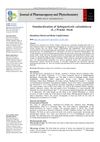 44 citations,
August 2012 in “Journal of Food Science”
44 citations,
August 2012 in “Journal of Food Science” The best way to extract saponins from Eclipta prostrasta is using 70% ethanol, at 70°C for 3 hours with a 14:1 liquid to solid ratio.
 32 citations,
January 2021 in “Molecules”
32 citations,
January 2021 in “Molecules” Some Middle Eastern plants may help treat diabetes and could be alternatives to current drugs, but more research is needed.
 27 citations,
June 2015 in “Revista Brasileira de Farmacognosia”
27 citations,
June 2015 in “Revista Brasileira de Farmacognosia” Safflower has been used in traditional medicine for centuries and shows promise in treating heart, brain, and inflammatory conditions, but more research is needed to ensure its safety.
[object Object]  19 citations,
January 2009 in “Journal of Young Pharmacists”
19 citations,
January 2009 in “Journal of Young Pharmacists” Alcoholic extract of Eclipta alba may help treat allergies and is safe at high doses.
 7 citations,
January 2019 in “Pharmaceutical Biology”
7 citations,
January 2019 in “Pharmaceutical Biology” Eclipta prostrata helps hair growth and maintains the growth phase by affecting certain growth factors.
 6 citations,
May 2018 in “Plant Cell, Tissue and Organ Culture (PCTOC)”
6 citations,
May 2018 in “Plant Cell, Tissue and Organ Culture (PCTOC)” Adding yeast extract and methyl jasmonate to Eclipta alba cell cultures increased the production of the compound wedelolactone.
 3 citations,
January 2016 in “Chemical sciences journal”
3 citations,
January 2016 in “Chemical sciences journal” Tridax procumbens plant extracts, especially from ethanol, have strong antibacterial effects and contain beneficial compounds like flavonoids and tannins.
 January 2024 in “International Journal For Multidisciplinary Research”
January 2024 in “International Journal For Multidisciplinary Research” Eclipta prostrata Linn has many health benefits and is used in traditional medicine.
 January 2024 in “Tropical journal of pharmaceutical research”
January 2024 in “Tropical journal of pharmaceutical research” Cirsium japonicum var. spinossimum seeds may help reduce inflammation and fight cancer.
 May 2023 in “Journal of pharmacognosy and phytochemistry”
May 2023 in “Journal of pharmacognosy and phytochemistry” The study established quality standards for Sphagneticola calendulacea stem and suggested it may have therapeutic benefits.
 May 2022 in “International Journal for Research in Applied Science and Engineering Technology”
May 2022 in “International Journal for Research in Applied Science and Engineering Technology” Eclipta prostrata has potential as a natural antibiotic.
 May 2022 in “Journal of pharmacognosy and phytochemistry”
May 2022 in “Journal of pharmacognosy and phytochemistry” The evaluation of Creeping Daisy leaves found important characteristics and compounds that support its use in medicine.
 June 2020 in “International journal of medical science and clinical invention”
June 2020 in “International journal of medical science and clinical invention” Modern research supports traditional uses of Yarrow for hair loss and skin issues.
 January 2019 in “International Journal of Herbal Medicine”
January 2019 in “International Journal of Herbal Medicine” The polyherbal emulgel created for hair care was safe, had good qualities, and could lead to future hair care products.
 183 citations,
January 2018 in “Cosmetics”
183 citations,
January 2018 in “Cosmetics” Essential oils in cosmetics can offer benefits but may cause allergies and should be used carefully.
 170 citations,
September 2019 in “Evidence-based Complementary and Alternative Medicine”
170 citations,
September 2019 in “Evidence-based Complementary and Alternative Medicine” Some medicinal plants can help heal wounds and may lead to new treatments.
 118 citations,
July 2005 in “Journal of Ethnopharmacology”
118 citations,
July 2005 in “Journal of Ethnopharmacology” Eclipta alba extract improved learning, memory, and stress-related ulcers in rats without affecting movement or causing anxiety.
 75 citations,
June 2019 in “International Journal of Molecular Sciences”
75 citations,
June 2019 in “International Journal of Molecular Sciences” Costunolide may have multiple health benefits, including promoting hair growth and protecting against cancer and diabetes, but more research is needed.
 75 citations,
November 2016 in “Medicines”
75 citations,
November 2016 in “Medicines” Beta-sitosterol has potential health benefits but needs more research to fully understand its effects and improve its use in treatments.
 69 citations,
December 2011 in “Journal of Ethnopharmacology”
69 citations,
December 2011 in “Journal of Ethnopharmacology” Some Thai plants, especially Carthamus tinctorius, could help prevent hair loss and promote hair growth without adverse effects.
 61 citations,
January 2018 in “Cosmetics”
61 citations,
January 2018 in “Cosmetics” Coffee silverskin may be a beneficial and safe ingredient for cosmetics, offering hydration, firmness, and potential hair growth benefits.
 46 citations,
August 2019 in “Journal of Ethnopharmacology”
46 citations,
August 2019 in “Journal of Ethnopharmacology” Eclipta prostrata has many traditional uses and health benefits, but more research is needed to understand how it works and ensure it's safe.
 41 citations,
July 2015 in “Current Drug Discovery Technologies”
41 citations,
July 2015 in “Current Drug Discovery Technologies” Some plants may help with hair growth and have fewer side effects than synthetic drugs, but more research is needed to confirm their effectiveness.
[object Object]  39 citations,
December 2013 in “Phytotherapy Research”
39 citations,
December 2013 in “Phytotherapy Research” Safflower (Carthamus tinctorius) extract helps hair grow and could be used in hair products.
 33 citations,
May 2013 in “Andrologia”
33 citations,
May 2013 in “Andrologia” Some herbs show promise as antiandrogenic agents.
 30 citations,
June 2015 in “South African journal of botany”
30 citations,
June 2015 in “South African journal of botany” Traditional healers in Namibia use 70 different plants to treat AIDS-related diseases, and more research is needed to test these plants' effectiveness against HIV.
 25 citations,
November 2015 in “Journal of Ethnopharmacology”
25 citations,
November 2015 in “Journal of Ethnopharmacology” Certain Chinese herbs, especially Cacumen platycladi, can promote hair regrowth and reduce hair loss-related hormone levels in mice.
 24 citations,
June 2021 in “Agronomy”
24 citations,
June 2021 in “Agronomy” Protein hydrolysates applied to roots or leaves differently improved lettuce yield and quality, with the best results seen in specific combined treatments for each type.
 22 citations,
January 2015 in “Actas dermo-sifiliográficas/Actas dermo-sifiliográficas”
22 citations,
January 2015 in “Actas dermo-sifiliográficas/Actas dermo-sifiliográficas” Platelet-rich plasma might help with skin aging, ulcers, and hair loss, but more research is needed to prove its effectiveness and safety.
 17 citations,
February 2015 in “Phytochemistry Reviews”
17 citations,
February 2015 in “Phytochemistry Reviews” Southeast Asian herbs show promise for skin and hair care, but more research is needed to confirm their effectiveness in cosmetics.





























